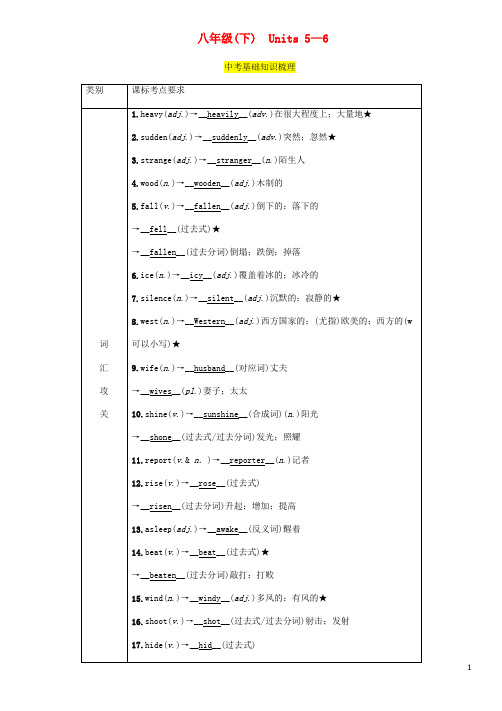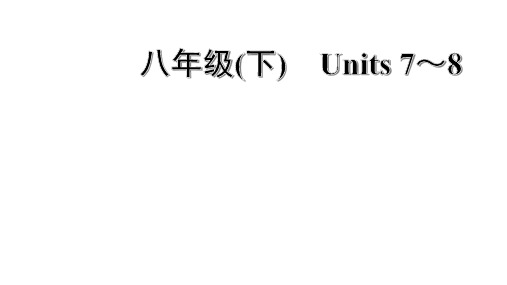中考英语复习课本知识八年级下Unit
8年级(下)Units 7~8---中考英语复习教材核心词汇知识点精讲精练(人教版)

_f_o_rc_e_
11. 大海; 海洋n.
_o_ce_a_n_
12. 成年的; 成人的adj. 成人; 成年动物n.
_a_d_u_l_t
13. 野生的adj.
_w_i_ld_
14. 政府; 内阁n.
_g_o_v_e_r_n_m_e_n_t_
15. 油; 食用油; 石油n.
_o_i_l
16. 巨大的; 极多的adj.
【短语快译】
1. (可以)随便(做某事)
_fe_e_l_f_r_e_e
2. 据我所知
_a_s_f_a_r_a_s_I__k_n_o_w_
3. 吸入; 吞入(体内)
_ta_k_e__in_
4. 面对(问题、困难等)
_in__th_e__f_a_ce__o_f
5. 即使; 虽然
_e_v_e_n_t_h_o_u_g_h_
中考英语复习教材核心词汇知识点精讲精练(人教版) 精讲14. 8年级(下)Units 7~8
基础梳理 夯实竞争力
【核心词汇】 1. 平方; 正方形n. 2. 米 ; 公尺n. 3. 深的; 纵深的adj. 4. 沙漠n. 5. 人口; 人口数量n. 6. 墙n. 7. 古代的; 古老的adj. 8. 厚的; 浓的adj.
【直击考点】
( D )1. (2020·孝感中考)—Dear friends, do you still remember why you
came here three years ago?
—To______ our dreams!
A. copy
B. save
C. imagine
D. achieve
【核心归纳】
【考点3】辨析achieve与come true 课本原句 The spirit of these climbers shows us that we should never give up trying to achieve our dreams. 这些登山者的精神向我们表明我们应该永不放弃实现我们的梦想。 (Unit 7, P51)
【人教版】中考英语总复习八年级下册Unit5-6祥解

中考英语总复习资料第11讲八年级英语下册Units 5-6一、重点词汇1.begin(v.)→(n.)开始2.heavily(adv.)→(adj.)重的3.suddenly(adv.)→(adj.)突然的4.strange(adj.)→(n.)陌生人5.report(v.&n.)→(n.)报告者6.wood(n.)→(adj.)木制的7.ice(n.)→(adj.)冰冷的8.completely(adv.)→(v.)完成9.silence(n.)→(adj.)沉寂的10.truth(n.)→(adj.)真实的11.shoot(v.)→(过去式)→(过去分词) 12.husband(n.)→(n.对应词)妻子13.gold(n.&adj.)→(adj.)金子制的二、重点短语1.(闹钟)发出响声2.接电话3.感觉像是4.睡着;进入梦乡5.逐渐变弱6.看一看7.费力地前进8.沉默;无声9.拆除;往下拽;记录10.首先11.忙于做某事12.醒来13.有点儿;稍微14.代替;反而15.变成16.爱上17.结婚18.从前19.出版;开花20.第一次三、重点句型1.当暴风雨来时,他正在做什么?What he when the rainstorm came?2.当琳达在睡觉时,詹妮正在帮玛丽做作业。
While Linda ,Jenny Mary her homework.3.外面没有光亮,感觉像是半夜。
no light outside,it midnight.4.我难以清楚地想起那以后的事因为我很害怕。
I had clearly after that because I was very afraid.5.移山似乎是不太可能的。
It doesn't very to move a mountain.6.对于这个故事,你们有不同的观点,并且你们两个人都是对的。
You have different about the story,and of you are wrong.7.你听到继母正计划着杀死我们吗?Did you hear our stepmother kill us?8.除非我们(这样)做,否则我们不会找到出路。
中考新版八年级英语下册第1至第10单元知识点总结+单元知识点归纳

中考新版八年级英语下册第1至第10单元知识点总结+单元知识点归纳中考新版八年级英语下册第1至第10单元知识点总结Unit 1 What’s the matter?一、基础知识1. What’ s the matter with you?= What’s the trouble with you?= What’ s wrong with you? 你怎么了?【注】:matter 和trouble 为名词,其前可加the 或形容词性物主代词,wrong 是adj. 不能加the2. have a cold=catch a cold=have the flu 感冒have a fever发烧have a cough 咳嗽have a stomachache胃疼,肚子疼have a toothache牙疼have a headache头疼3. 身体部位+ache(疼痛)构成新的复合词stomach+ache=stomachachehead+ache=headachetooth+ache=toothacheback+ache=backache后背痛4. much too+形容词,意为太...... ,too much+名词,意为很多,大量。
5. lie down躺下,lie lay lain lying 躺lay laid laid laying放/ 下蛋lie lied lied lying 说谎6. maybe“或许”may be,是情态动词+be的结构,意为“可能,也许”7. get off (the bus)下(公交车)get on上车get into 进入get to到达get through穿过;完成8.agree with sth.同意某事agree to sb. 同意某人的意见9. be in trouble 遇到麻烦make trouble制造麻烦have trouble (in) doing sth.=have difficulties (in) doing sth做......有麻烦。
中考英语复习方案第一篇教材考点梳理第16课时Unit8八下

考
点 聚
词条
词性
含义
用法
焦
alive
形容词
活着的,在世的 通常只作表语或后置定语。keep alive 活着
形容词 活着的;有生命的 living things 生物 the living 活着的人
小随
living
测堂 达
Hale Waihona Puke 名词标生计
make a living谋生
lively 形容词
有生气的, 生机勃勃的
→ carelessness (n.) 词 → carelessly (adv.) 汇 8. harm v. 拓 → harmful (adj.)有害的 展 → harmless (adj.)无害的
* do harm to/be harmful to
对……有害
9. simple adj. → simply (adv.)
小随 测堂
工作再努力点儿对他没什么害处(hài chu)。
达
标
【拓展】harm的形容词形式是harmful,意为“有害的”。do harm to…=be harmful to…,
(dá biāo)
意为“对……有害”。
【典例】Drinking alcohol(白酒) can be
the brain. So people in China aren't
, wewill be fined by
the
型 police.
再 7. 记住,每个人都可以做一些(对环境)有影响的事情to !make a difference
现 Remember that everyone can do
something
to take proper acti!on protect our environment
中考英语总复习第1部分教材知识梳理篇八下Units5_6(精讲)检测

八年级(下) Units 5—6 中考基础知识梳理.)真正的;真实的__ma ke__one's__wa y____What__were__you__doing__ at eight last nightthe teachers and辨析sleep ,sleeping ,sleepy 与asleep (教材八下P35)【满分点拨】用sleep ,sleeping ,sleepy 与asleep 填空。
1.(热点题)He stayed up all night to watch the 2018 FIFA World Cup ,so he felt __sleepy__ in the daytime.2.(原创题)He needs to take __sleeping__ pills(药丸) to go to __sleep__.3.(2018临沂中考改编)Jimmy could not __sleep__ at first.He finally fell __asleep__ when the rainstorm stopped at midnight.pick up 的用法(教材八下P34)【满分点拨】( A )—Lucy,what's on the playground?—Oh,it's Lily's school uniform.Could you please help her to______?A.pick it up B.put it onC.give it outremind的用法(教材八下P42)【满分点拨】remind sb.of sth.提醒某人某事I want to remind you of the rules for school parties.关于学校晚会,有几个规定我想提醒你们。
remind sb.to do sth.提醒某人做某事Please remind me to post the letter on the way to school.请提醒我在上学的路上把信寄了。
八下Units 5-6(知识梳理+常考易错点归纳)(解析版)- 备战2024年中考英语一轮复习

专题11八下Units5-6(知识梳理+常考易错点归纳+强化提升练)(解析版)掌握5-6单元的重点单词、词组和句式以及语法,做到熟练运用。
一、词汇1.重点单词的含义及用法:good manners良好的礼仪;cut in(on sb/sth)打断(谈话),插嘴shake one’s hand与某人握手;in public公开地,在别人面前;obey traffic rules遵守交通规则push in插队,加塞;bump into碰到,撞到;by accident偶然,意外地;express oneself自我表达hold a talk举行一次报告;say hello to sb向某人问好;avoid doing sth避免做某事;risk doing sth冒险做某事;provide sth.for sb.为某人提供某物;be born with生来具有……;donate blood献血;according to 根据;as soon as possible尽快;lead to导致;homeless people无家可归的人;receive training接受培训;achieve one’s dream实现某人的梦想;feel like+n./doing sth.想要某事/做某事,感觉像某物/做某事;expect to do sth.期待做某事;offer to do sth.主动做某事2.易混词辨析:in one’s way“挡住某人的路”和on one’s way to“在.......路上”的区分;above all“首先,首要的是”和first of all“第一”的区分;drop litter everywhere到处乱扔垃圾;leave the tap running让水龙头一直流淌;sth happens to sb某事发生在某人身上;take place“发生;举办”和happen“发生”的区别;warn sb (not)to do sth警告某人(不)要做某事;try(not)to do sth努力(不)做某事;be made up of又……组成;give a helping hand伸出援助之手;not…but…不是……,而是……二、句型1.Do they greet people with a kiss?2.But please avoid subjects like age,weight or money.3.They think it’s rude to push in before others.4.If you’re in their way,they won’t touch you or push past you.5.Practice makes perfect.6.I’m training to be a volunteer for the Olympic Games.7.It’s meaningful to do something for the Olympics.8.They can provide special places for homeless people to stay.9.To Li Hai,the most important thing is not to win a gold or a silver,but to take part.三、重点语法Unit5Unit61enough to的句式It is+adj+for sb/of sb+to do sth的句式2too.....to......句式1.注意其中形容词adj的区分,指人的情况下1.Sb is adj+enough+to do sth表示“某人足够需要用介词of;指物的情况下需要用介词for 怎么样可以做某事。
中考英语复习人教版 八年级(下) Units 7~8重点词汇附答案

13. _(b_e_)_f_u_ll_o_f______ 满是……的;(有)大量的;(有)丰富的 14. _n_o_m__o_r_e_t_h_a_n___ 不超过;仅仅;只是 15. _a_s_f_a_r_a_s_I_k__n_o_w_ 就我所知 16. _ev_e_n__t_h_o_u_g_h_/_if__ 即使;虽然 17. _ev_e_r__si_n_c_e____ 自从 18. o_n__e_a_n_o_t_h_e_r__ 互相 19. _o_r_s_o___ 大约
4. If you only focus on your problems, you'll have a life___fu_l_l_o_f____ them.[鲁教九(全)Unit 1 P10] 5. Jane discovered that these animals greet_o_n__e_a_n_o_t_h_e_r_ with a kiss or a hug, and make and use tools—just like humans do. [上海牛津七(下)Unit 8 P114] 6. I_n__t_h_e_f_a_c_e_o_f_difficulty, never give in and you will succeed sooner or later.[2019宜宾单选25题] 7. When going upstairs or downstairs, we need to walk on the right, leaving the left space for the people who__h_u__rr_y__u_p___.
动词
5. protect(v.)保护;防护
→_p_r_o_te_c_t_io_n____ (n.)保护;保卫 →_p_r_o_te_c_t_o_r____ (n.)守护者;保护装置 9 次 ★_p_r_o_te_c_t_s_b_._f_r_o_m_/_a_g_a_i_n_st__(d_o_i_n_g_)_s_t_h_. _保护某人免受……的伤害
2021年人教版英语中考复习课件 八年级下册 Unit 1-Unit 2

【考点即练】 用含put的动词短语的适当形式填空。 (1)[2020·南宁初三月考]The photos that won the first prize in the competition will be___p_u_t_u__p__on the website. (2)[2020·辽宁初三月考]It's a good habit for us that we should never ___p_u_t_o_f_f__today's work till tomorrow. (3)[2020·江苏初三模拟]Since you have finished your post,please __p_u_t_ _a_w_a_y___ the paints in the box. (4)I really need to take more exercise because I'm __p_u_t_t_in_g__o_n___ weight.
3.give up give up意为“放弃”。give up是动副型短语,既可单独使用,也可接名 词、代词或动词ing形式作宾语。代词作宾语时,必须放在give和up中 间。 例:She gave up her job to join her husband's campaign.她辞去工作, 加入到丈夫的宣传活动中。 【考点即练】 (1)My husband said he would give up ___p_la_y_i_n_g___ (play)computer games,but he never did it. (2)[2020·青海初三月考改编]Once you get into the habit of smoking, you'll find it hard to ___g_iv_e__i_t _u_p___ (放弃它).
- 1、下载文档前请自行甄别文档内容的完整性,平台不提供额外的编辑、内容补充、找答案等附加服务。
- 2、"仅部分预览"的文档,不可在线预览部分如存在完整性等问题,可反馈申请退款(可完整预览的文档不适用该条件!)。
- 3、如文档侵犯您的权益,请联系客服反馈,我们会尽快为您处理(人工客服工作时间:9:00-18:30)。
2010中考英语复习课本知识整理八年级下Unit6 How long have you been collecting shells?【知识梳理】【课文解析】1. since的用法:(1)conj.①(引导时间状语从句,从句中常用过去时,主句用一般时态或完成时)自从……以来;……以后。
eg.It was years since l had seen her.自从我见到她(到那时)又过去好几年了。
his just a week since we arrived here.我们到这儿刚好有一周了。
②(引起原因状语从句,通常置于句首)既然;因为eg.Since he says so,it must be true.既然他这么说,那一定是真的。
(2)prep.自……以来eg.I have lived here since childhood.自小我就住在这儿。
He hasn't been home sincel993.1993年以来他还没有回过家。
(3)adv.①(与完成时态连用)从那以后;后来eg.He left the city in 1985 and has returned only once since.他1985年离开这座城市,自那以后只回来过一次。
②以前(4)构成短语:ever since从那以后(一直)long since很久以前;早已2. since,from和for(1)from是介词,后接名词、动名词,表示事情的开始点,以from短语作状语时,句中的谓语动词可用一般现在、过去和将来时,如:(4)stop sb.(from)doing sth. 表示“叫某人停止做某事,阻止某人做某事”。
例如:What can stop me(my)going? 有什么能阻止我去呢?Nothing shall stop us from studying.什么都不能阻止我们学习。
5. have to do sth. 表示“不得不做某事”,指客观条件的“不得不”I have to finish the work by myself.我不得不自己完成这项工作。
6. r un out of… 意为“从……地方跑出来;用光……”Class is over.The students run out of the classroom.下课了,学生们从教室里冲了出课文解析1. How long have you been in class today? 你今天上了多长时间的课?(或你在课堂多长时间?)(1)how long “多长”或“多长时间”。
对长度或时间段提问。
-- How long have you learned English? 你学英语多长时间了?-- For two years. 两年了。
(2)in class在上课;在课堂上,其反义词为out of class “在课外”。
We should read more books out of class. 我们在课外应该多读些书。
I have been in class for one hour. 我上了一个小时的课。
(3)现在完成时①表示过去发生的动作对现在造成的影响。
eg.We shall expect you,by the way,dinner will be at eight.我们正在等着你,还有晚饭是八点开。
I was reading when the earthquake occurred,by the way,it was “The Last Day of Pompeii”.地震发生时我在看书,顺便提一下,我看的是“庞培城的末日”。
By the way,have you seen her lately? 顺便问一下,你近来见过她吗?(2)名词hobby表示“爱好”是可数名词。
例如:Your hobby is reading.你的爱好是看书。
One of my hobbies is astronomy.我的爱好之一是天文学。
Plenty of men are excellent cooks as a hobby.很多男人菜做得好,只是作为一种爱好。
6.It made me think about differences in food cultures between China and western countries.它使我想起了中国和西方国家在饮食文化方面的差异。
(1)make使役动词“使;让”,后面接不定式作宾语补足语时,不带to,类似的还有let和have。
eg.He made the students laugh.他把同学们逗笑了。
The children must be made to clean their own room.必须叫孩子们打扫自己的房间。
Aunt Li tried to make us stay for supper. 李大婶要留我们吃晚饭。
(2)think about考虑;回想,想起;认为eg.think about a plan 考虑一项计划I always think about her when it snows.每当下雪的时候,我总是想起她。
What do you think about the film last night? 你认为昨晚的电影怎么样?He was thinking about the time he spent in the army.他正在回想他在部队度过的日子。
We need to think about the plan.我们需要考虑一下这个计划。
(3)介词between表示在二者之间There is a fence between his garden and our garden.在他的花园和我们的花园之间有一道栅栏。
You're to sit between Moira and me.你坐在莫伊娜和我之间。
五.【词语辨析】1. every和each(1)each一定数目中的“每一个”;“个别”意义较重,表示各有不同,更强调个人或个别。
eg.Each one has his weakness.每人都有每人的弱点。
(2)every数目不确定的许多人或物中间的“每一个”;“总合”意义较重,表示“大家一致”。
eg.Every one of us is here.我们都到了。
(3)each可作主语、同位语、定语和状语,而every只能作定语。
2. interest,interesting与interested(1)interest作名词,意为“兴趣,趣味”,用作动词时指“使(人)产生兴趣”。
例如:He shows an interest in music.他对音乐感兴趣。
What you said interests me.你的话引起了我的兴趣。
(2)interesting作形容词,指“有趣的,引起兴趣的”,可作表语或定语,指物或人本身能引起兴趣。
例如:The film is very interesting.电影非常有趣。
He is an interesting man.他是一个有趣的人。
(3)interested是由动词interest加-ed构成的形容词。
意为“感兴趣的”,其主语一般是人,常用于be/get/become interested in结构中,表示“对……感兴趣”。
例如:When he was only a child,he got interested in science.当他还是个孩子时,就对科学产生了兴趣。
3. how long,how often 与how soon(1)how long 的意思是“有多长”,用来提问有多长时间,答语通常是more than two weeks 等表示一段时间的话。
例如:--How long are you going to stay here?你打算在这里待多久?--Five days.5天。
--How long did he live in China?他在中国住了多长时间?--More than two years.两年多。
(2)how often的意思是“多长时间一次”,用来提问在某一特定的时间内进行某个动作的次数,答语通常是never,sometimes,quite often,usually,three times a year等表示频度的副词或短语。
例如:--How often do you go to the library?你多长时间去一次图书馆?--Once a day.一天一次。
(3)how soon用来询问“需要多长时间能,过多久”,谓语动词多用终止性动词,即某一动作要花多长时间才能完成或发生,常与将来时连用,答语常用in a week/month/year等。
例如:--How soon can you finish the work?你完成那项工作还要多久?--May be in three days.大概3天后。
--How soon will he get here?他到这儿需要多久?--In half an hour.半小时。
4. have与musthave to与must都有“必须”的意思,但有其不同之处:(1)have to有时态和人称变化,带有客观因素,意思是“不得不”;must无时态和人称变化,后面接不带to的不定式,带有主观因素,意思是“必须,一定”。
例如:I have to go now.It's dark.我必须得走了。
天已黑了。
I must go.我得走了。
(2)must not表示“不许,一定不能”;don't have to表示“不必”。
例如:You mustn't go now.你现在不许走。
You don't have to go so early.你不必走那么早。
(3)Must I…?的否定回答是No,you needn't.或No,you don't have to.例如:--Must I stay here now?我必须留在这吗?--NO,you needn't./you don't have to.不,你不必。
5. fairly与ratherfairly与rather同义但用法不同:fairly一般指(褒义的)理想的情形,rather一般指(贬义的)不太理想的情形。
例如:The weather is fairly fine today.今天的天气相当好。
The weather was rather bad yesterday.昨天的天气相当不好。
